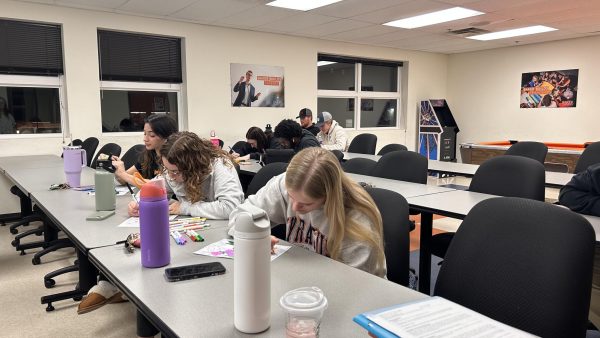‘The Mask You Live In’ redefines masculinity
Baker University’s Student Activities Council and Active Minds came together Tuesday night for “The Mask You Live In,” which was the final presentation in a long list of events this semester that were a part of a program called Cat Chat.
The different events throughout the semester that Cat Chat facilitated were centered on mental and physical health. This particular presentation was specific to the mental health aspect of the semester-long series.
“The people who created this documentary gave our university the right to show them film to students for free,” Director of Student Life Randy Flowers said.
The film was titled Representation. The focus was to show how the idea of masculinity affects boys in our country, and then how those effects can impact their lives later in adulthood.
“The Mask You Live In” was a phrase mentioned throughout the film. The “Mask” that is talked about in the video refers to a cover-up that boys and men figuratively wear to appear more masculine.
The documentary showed how placing men in a box of what it means to be masculine has devastating affects on their mental health. Problems associated with poor mental health were things like violence and drug abuse.
“I hope the video opened people eyes to stigma associated to masculinity,” junior Jami Sanborn said.
A startling statistic shown in the video was that 90 percent of gun violence is committed by men. This is a prime example of how masculinity in boyhood affects a person later on in life. Guns and violence are often associated with masculinity, and young boys sometimes play with toy guns.
Those who attended the event learned that boys pick up what is masculine through things like peers, family and pop culture.
Producers in the film emphasized that the only way to fix this problem is to talk about it and gain this movement more publicity. Viewers of the film were encouraged not only to deter young men from feeling the need to conform to society’s view of what it means to be masculine, but to help older boys and young men through the problems that come with being placed in the box of masculinity.
The video explained that being bullied for not being masculine enough can lead to problems such as depression and how to detect depression in boys and men, because the symptoms are sometimes not ones people normally would associate with depression.
“This video was by far the most influential video shown to me in my adult life,” freshman Mitchell Lierz said. “This video will tug on your heart strings for some, and for others it may open your eyes to issues facing young people today.”











